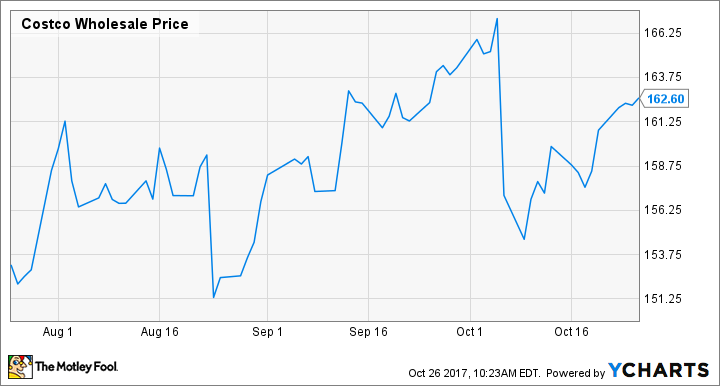Can Costco Regain Its Mojo?
Seemingly every time Wal-Mart (NYSE: WMT) or Amazon.com (NASDAQ: AMZN) makes a major move, analysts start predicting the demise of Costco (NASDAQ: COST).
This comes from the idea that since so many retailers have been hurt by the two digital leaders, it's inevitable that the warehouse club will eventually succumb. Of course, Wal-Mart is relatively new to the conversation, but its aggressive e-commerce growth efforts make it another supposed threat to Costco.
The problem is that the argument that the changing nature of how consumers shop will eventually hurt all brick-and-mortar success stories isn't true. It seems as if it's the truth, but it's more of a guess or an extrapolation based on the available data.
Saying Costco will see its business suffer because of the internet because many other retailers have is like saying you're going to get the flu because most of your friends had it. In many cases, that's what happens, but not always -- and the membership-based retailer is the exception.
Image source: YCharts.
Why is Costco different?
Unlike a traditional retailer, Costco doesn't make most of its money from selling merchandise. Instead, about 75% of its revenue comes from membership sales. That means the company's biggest concern is holding on to members, something it has consistently been able to do.
The warehouse club's membership fees were up 13.4% in Q4 2017. That's partly due to the chain's raising its prices slightly in June and partly due to its adding new members. Renewal rates remain within historical norms for the company, and more customers are opting for the $120 Executive membership, which offers 2% cash back on purchases up to $1,000.
CFO Richard Galanti did acknowledge during the chain's most-recent earnings call that there was a slight down-tick in renewals in Q4, but he blamed that on carryover from the company's credit card switch in 2016. In reality, the numbers are nearly dead-even with recent years.
"Business members renewed at 94%, Gold Star members at 89.3%," Galanti said. "These are numbers for the U.S. and Canada combined, which is over 80% of our company, and total U.S. and Canada [came in at] 90%, and worldwide, 87.2%, a slight tick down of a tenth or two from the last quarter."
If Costco doesn't lose members, then it doesn't have to worry about its business. The chain has clearly held on to its customer base, and its fiscal 2017 comparable-store sales were up 4.1%, while its e-commerce business grew by 13%.

Costco makes most of its money from selling memberships. Image source: Costco.
Costco doesn't fear Amazon or Wal-Mart
Yes, Amazon and Wal-Mart continually step up their games. But that only becomes a problem for Costco if the company starts to lose members, and that hasn't happened.
Costco stock generally trends down whenever either of its two big rivals announces some new initiative. The logic is that if either Wal-Mart or Amazon improves pricing or convenience, Costco members will have less reason to renew.
The problem with that thinking is that it doesn't reflect how Costco customers behave. Some visit the warehouse club often, but most don't. Executive members make up about one-third of the company's customers but account for roughly two-thirds of its sales.
Those other customers largely pay $60 a year because they hope to visit more and save more money. They may, or they may not, but $60 is a small price to pay for the possibility.
Costco is fine
Costco isn't simply sitting back and hoping that its past success and customer loyalty continue. It has been slowly improving its digital operations, and it has launched new delivery options for customers.
In reality, Costco's mojo has always been intact, but the stock market panics when the company doesn't. This is a stay-the-course company that plans for the long term, and there's no reason to expect its business to not perform as it has for many years.
More From The Motley Fool
6 Years Later, 6 Charts That Show How Far Apple, Inc. Has Come Since Steve Jobs' Passing
Why You're Smart to Buy Shopify Inc. (US) -- Despite Citron's Report
John Mackey, CEO of Whole Foods Market, an Amazon subsidiary, is a member of The Motley Fool's board of directors. Daniel B. Kline has no position in any of the stocks mentioned. The Motley Fool owns shares of and recommends Amazon. The Motley Fool recommends Costco Wholesale. The Motley Fool has a disclosure policy.

